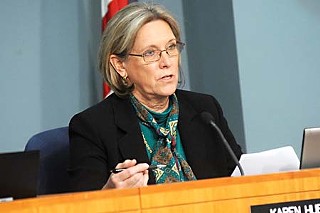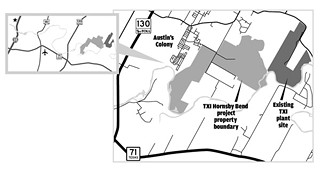Point Austin: The Army Saves the Day
The Corps of Engineers speaks, and Travis County and TXI hang fire
By Michael King, Fri., Jan. 15, 2010

The cavalry arrived just in time.
With the sound of a trumpet riding over the hill – more precisely, a series of last-minute e-mails and phone messages – the beleaguered Travis County commissioners were saved from having to make a final decision in the battle between Texas Industries Inc. and the residents of eastern Travis County (just this side of Webberville). It's not at all clear whether the rescue will stick or if the county and residents have just bought a little more time to try to fend off TXI's plans for a major aggregate mining operation. But it was an undeniably dramatic Tuesday meeting at Commissioners Court, with the punctuation provided by Travis County Judge Sam Biscoe. "I came in here this morning," said the judge, "thinking we would be ready to make a decision. Now this e-mail does muddle things for us."
Even more surprisingly, the uniformed cavalry in this instance is none other than the Army Corps of Engineers (Fort Worth District), in the person of Permits Section Chief Jennifer Walker, who informed an inquiring resident and then the county that the Corps will certainly want to take a look at this project and may require a full permitting review before the work may proceed. The details are all very much up in the air – taken by surprise that morning, TXI continues to insist that no such review or permit is required – and both the county and the company will be consulting with the Corps to find out what happens next.
Barely noticed in the uproar was that it took an inquiry from an Austin's Colony resident, Ryan Metz, to alert the Corps that it might have jurisdiction over the project, under the Clean Water Act. County staff had accepted at face value TXI's assertion that no federal review is required. "We require the applicants to make that coordination," county engineer Teresa Calkins told me later.
In light of the new information, Biscoe asked Calkins for her response. Calkins said that based on her conversation with Walker, she thought the court should delay action until the Corps determines whether it indeed has jurisdiction – the court unanimously concurred. Asked after the meeting if he had any reaction to the news from Fort Worth and the decision by the court, TXI attorney Henry Gilmore said only, "We're still plugging."
Trouble in Mine
Coming into Tuesday's meeting, it seemed likely that the project would be allowed to go forward. Last week Biscoe told me that the court's attorneys had informed the commissioners that the county could not legally block the project, and a negative vote would almost certainly result in a quickly successful TXI lawsuit. State law specifically prohibits counties from regulating land use, and repeated efforts by counties to acquire that authority have been rejected by the Legislature – yet another attempt, prominently championed by Precinct 3 Commissioner Karen Huber, was scuttled last year. Biscoe indicated that he didn't see that the commissioners had much choice and was frankly surprised that the court didn't vote to approve a development permit in its Dec. 22 meeting – deciding instead to attempt mediation and in the meantime design a county monitoring program for health and safety issues.
Biscoe's a blunt and pragmatic man, and when asked if he believes – as distinct from the legal issues – whether the TXI project, if allowed to go forward, is indeed likely to cause ongoing health and safety problems for the area in the future, he didn't hesitate to answer: "Yes." Nonetheless, based on the previous discussion and preliminary votes, it seemed likely that the court would vote 3-2 to approve. Adamantly opposed is Ron Davis, whose Precinct 1 includes the site. But the only other commissioner who had expressed a willingness to join Davis was Huber, although she acknowledged reluctantly that it seems the law is with TXI. "I don't oppose all mining projects," Huber told me, "but there is nothing good about this mining operation in this location. I feel when our laws fail us, we have to make a stand."
Biscoe and Commissioner Margaret Gómez appeared to concur with Commissioner Sarah Eckhardt, who believes it inevitable that the county would lose a lawsuit already threatened by TXI. Eckhardt was attempting to find what she called a "doable middle way" by permitting the project but enforcing firm county monitoring of health and safety conditions – including both the mining and related truck traffic. "If we allow no wiggle room on safety," Eckhardt told me, "and spend that money monitoring the situation rather than just losing the court battle, I think that provides the greatest degree of aid to the residents."
A Call to Arms
Tuesday afternoon, Metz told the commissioners he believes that the Corps will require a full federal review and that Walker told him the corps doesn't "piecemeal" projects – it would review everything, including TXI's plans to upgrade the already dangerous FM 969 to accommodate an additional 700 daily truck trips. (The company would prefer a four-mile conveyor belt but shelved that plan to avoid a variance hearing from the city of Austin – the site is in Austin's extraterritorial jurisdiction.) The county requires that all other necessary permits be in place before it approves the project and will now await the results of the meetings between the Corps and TXI. Let's hope the court doesn't rely only on TXI's version of the conversation.
Whatever happens in this particular battle, that area of the county – a few miles beyond SH 130 and Austin's "desired development zone" – is poised to be the scene of many more skirmishes over development, historical farmlands, neighborhoods, and industry. TXI clearly plans to be the aggregator of first choice in that ready-mix future, and the county will be trying to find a reasonable balance between a burgeoning population and the construction industries required to service them. Huber specifically blamed the aggregate industry for killing county land-use authority at the Legislature, and said that if TXI manages to bulldoze the residents' homemade defenses, "the Hornsby Bend project will become the poster child for the next legislative session."
"I'm disappointed that we haven't come together to fight this," concluded Huber. "I just feel it's time to step up."
TXI Gravel Mine at Hornsby Bend
This map (provided by Texas Industries Inc.) shows the two tracts proposed for surface mining of aggregate (sand and gravel) known as TXI's Hornsby Bend project, about 2,000 mining acres in all, south of FM 969 near Webberville and on either side of Dunlap Road. The aggregate would be transported (either by truck or conveyor belt) to the existing TXI facility near Webberville. If the truck transport is confirmed, TXI has committed to upgrading the area roads before the mining project begins and later returning the mined land to agricultural conditions. Depending on the construction market for aggregate, the mining could last from 10 to 30 years.
Residents of the surrounding area, including recently constructed subdivisions (Chaparral Crossing, Kennedy Ridge, and Austin's Colony, which is indicated on the map) have objected to the TXI project, saying it will endanger public health and safety, lower property values, and reduce quality of life.
Got something to say on the subject? Send a letter to the editor.











